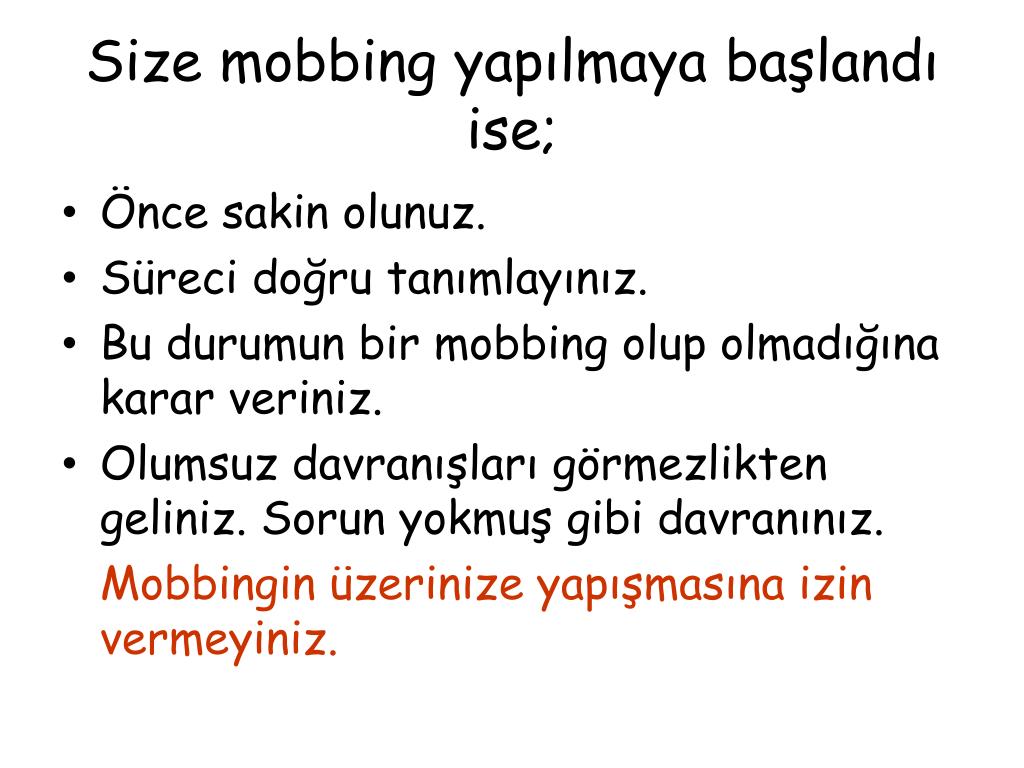Poor time management solutions
How to Improve Your Time Management Skills (7 Easy Ways)
Anyone would benefit from improving their time management skills - it definitely beats working under pressure anytime. After all, if you don't master your time, then opportunities, efficiency, and work-life balance might slip through your fingers!
Nonetheless, time management is easier said than done. As with most soft skills, it takes a lot of practice to get good at.
That said, there are ways to improve your time management skills, and in this article, we’ll teach you just what they are!
Let’s get started.
7 Best Tips to Improve Your Time Management Skills
#1. Determine Your Priorities
In your day-to-day activities, some tasks are more important than others. For example, a task might have a closer deadline than the rest, or the case might be that you need to finish task A before you can effectively complete task B.
The same can be said about achieving your long-term goals, whether it is a promotion or investing more time in a hobby.
Determining what your priorities are is the first step towards effective time management. Whether you're an employee or in high-level management, you should have a clear picture of your top priorities. After all, how can you set out to accomplish your goals until you identify them clearly?
One effective method to prioritize your daily tasks is the Eisenhower Matrix, which allows you to categorize and separate your most critical tasks from those that you can delegate or eliminate entirely.
The method is named after Dwight D. Eisenhower, the 34th president of the United States, who was widely recognized for his efficiency and discipline.
Here is what your methodical planning using the Eisenhower Matrix could look like:
#2. Avoid Multitasking
While many people praise their ability to multitask, there are just as many reasons to believe it can actually get in the way of improving your time management skills.
A 2011 research study from the University of California, for instance, found that multitasking can negatively affect your working memory and ability to focus on important tasks.![]() This, of course, isn’t great for time management.
This, of course, isn’t great for time management.
What’s more important, multitasking may just be overrated. What makes it true is the fact that, in reality, you never truly multitask. The various tasks you grapple with can be accomplished to some extent, but none will be to the best of your abilities.
It is essential to learn how to devote your whole attention to the task at hand if you want to improve your time management skills. Your productivity can only improve if you master sustained focus and effort.
#3. Avoid Distractions
Our daily lives are definitely fast-paced and full of distractions and, more often than not, that gets in the way of improving time management skills. If you’re working from home, for instance, it might be hard to concentrate on work due to having more distractions than in the office and, before you know it, you’ll have lost hours of your time.
Great ways to avoid distractions include putting your phone aside or turning off the notifications, having an office space even if you’re working from home, and asking family members or colleagues not to disturb you with non-work-related matters.
#4. Learn to Say No
Many people will take on as many responsibilities either to make a good impression and showcase their dedication to work or because they just can’t say no. Yet, an overwhelming amount of tasks can set a toll on your work efficiency and mindset.
Setting a limit on how much workload you're willing to accept can help you manage your time and concentrate on the most important tasks. In turn, you’ll be able to focus and be more productive in the most pressing tasks.
Start by determining how much work is ideal for you and then be sure and confident to decline any offered workload that goes beyond it. If you feel bad about not being able to help, just explain to whoever asked that you don’t have the time to do the quality work they expect or that you have other, more important deadlines to meet.
#5. Use Time Management Apps
It’s all too easy to get overwhelmed with never-ending daily reminders of scheduled tasks and meetings, and constantly trying to catch up can take a toll on your workflow.
Fortunately, technology has come a long way to help us in that regard.
By using time management apps, you can easily organize everything in one space and track your time for different tasks.
Time management apps like Rescuetime can significantly boost your efficiency. The app allows you to use a Focus Session mode whenever you truly need to focus, preventing main distractions and tracking how effectively you work.
Similarly, time tracking apps like Toggl Track can show you how much time you actually spend on any given task.
#6. Organize Your Day
A goal is nothing more than a wish without a solid plan to support it in place. And, without proper day-to-day organization, improving your time management skills can turn into a daunting task.
However, if you organize your day, prioritize your tasks, and measure your progress, you will know precisely where you stand as you work toward your bigger goals.
Now, there are several effective ways to organize your day and get immediate results. For example, work-wise, you can start writing daily to-do lists, taking into account any interruptions that may come up, or dedicating less time to repeating tasks.
For example, work-wise, you can start writing daily to-do lists, taking into account any interruptions that may come up, or dedicating less time to repeating tasks.
#7. Take Breaks
Although you might feel tempted to complete large amounts of work before taking a break, this strategy could seriously harm your mental health.
For starters, skipping frequent, short breaks might result in fast burnout and overwhelming stress. One study found that employees even tend to compromise their lunch breaks, choosing to work instead. This, in turn, has been shown to have badly impacted their mental health.
Stepping away from your work for a few minutes every couple of hours can help you achieve more with greater comfort and enjoyment, boosting your overall efficiency.
3 Benefits of Improving Your Time Management Skills
Taking steps to improve your time management skills has numerous advantages. More than being efficient at work, effective time management can help you significantly reduce stress and improve your work-life balance.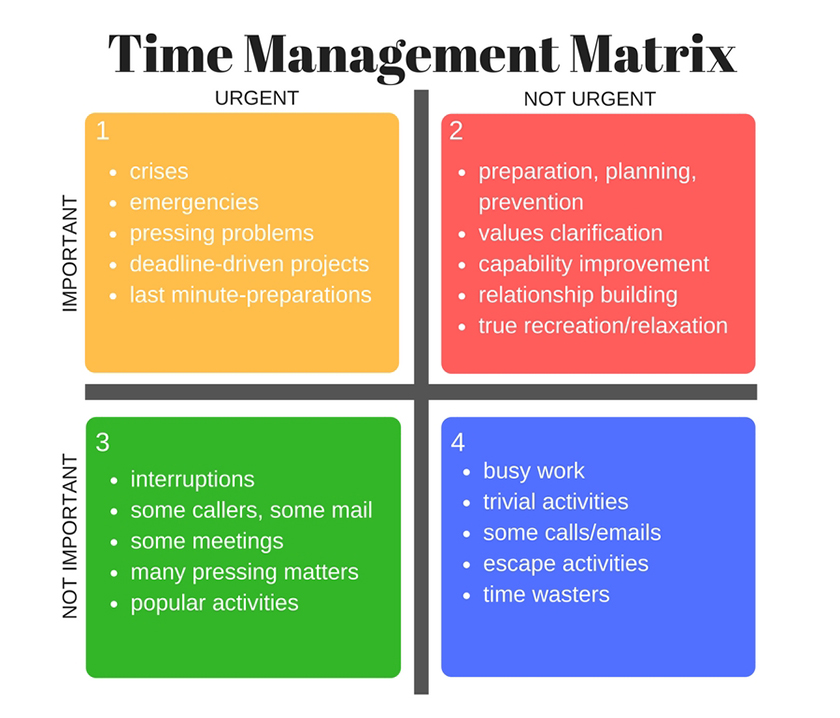
Here are the top 3 benefits that come with improving time management skills:
#1. Reduced Anxiety
A recent study found that poor time management not only hurts productivity but also your well-being.
Come to think of it, time is your most valuable asset. We all understand this, which is why it is critical to manage your time effectively and leave enough space for leisure activities, hobbies, and private life. Otherwise, you risk harming your mental health and putting yourself through more stress than you can handle.
Because we all need enough time for leisure activities, reconsider all elements of your daily life and design a strategy that will provide you with maximum benefits in the shortest possible amount of time.
By improving your time management skills, more and more spare time will appear for you to spend as you please.
#2. Enhanced Work-Life Balance
Too much work and too much leisure can both hurt your overall well-being. That’s why striking a balance that can help you get the most out of each without overdoing it is one of the biggest benefits of improving your time management skills.
According to the organizational psychologist Dr. Deirdre Anderson, an important aspect of taking care of your well-being is devoting time to all different aspects of your life.
Good time management is one of the most effective ways for you to find the perfect harmony between your personal life and work life.
#3. Achieving Your Goals
If you're used to procrastinating, you probably struggle with organizing your day and you constantly postpone your deadlines and goals. This not only consumes all of your time but may also keep you from achieving your dreams.
According to researcher Piers Steel, 95% of people procrastinate at least to some degree. While knowing you're not alone can be comforting, it's also sad to discover how much procrastination can hold you back.
Start by following these simple strategies to overcome your procrastination habits:
- Practice self-forgiveness: For starters, don’t beat yourself up too hard. Self-forgiveness can help you feel better about yourself.
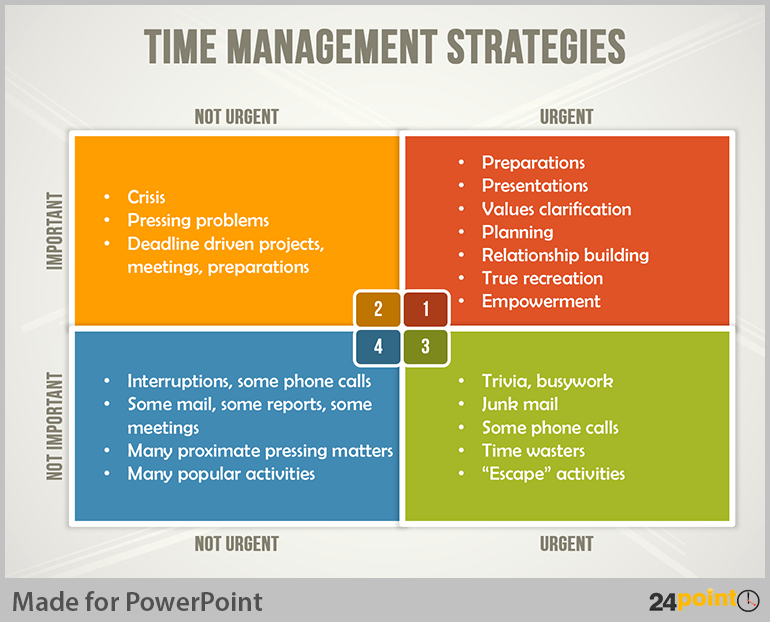 In fact, it lowers the likelihood of future procrastination.
In fact, it lowers the likelihood of future procrastination. - Reward yourself: If you manage to complete your tasks on time, treat yourself to a nice meal at a restaurant or something similar.
- Turn off your phone: This one may sound redundant, yet if you delve deeper and look at the University of Chicago's study on cellphones, which shows that even the mere presence of a wireless device badly impacts our cognitive capacity, you might want to reconsider.
So, it’s only natural that improving your time management skills can help you stop procrastinating and take you a step closer to your goals.
Looking to improve more than just your time management skills? Communication is just as important, so check out this guide to find out about how to make your communication skills stand out.
2 Types of Time-Management Skills
Developing solid time management skills is essential for controlling your time during a day and ensuring that it is used as efficiently as possible.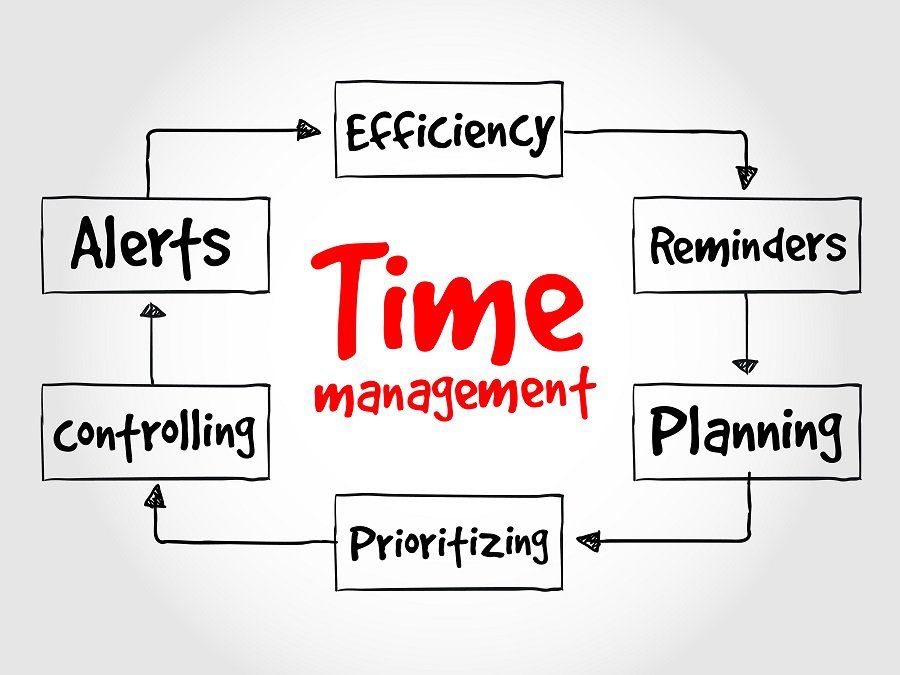
To practice effective time management, there are primary and secondary skills you should work on:
- Day-to-day organizing, task prioritizing, and planning ahead are primary time management skills essential for using your time wisely. You should be able to assign levels of importance to different tasks, devise solid plans for their accomplishment, and stick to the strict schedules you set for yourself.
- Seemingly unrelated parts of your life, such as regular exercise, eating healthy and getting enough sleep, directly impact your overall efficiency and hence your ability to manage your time. These can be called secondary time management skills.
So, before you delve deep into your next task with maximum concentration and your phone away, take 20 minutes to cycle around that lovely neighborhood of yours!
Key Takeaways
Now that we've covered all the tips and tricks to effectively managing your time, let's do a quick recap:
- Effective time management helps you organize your daily activities around your priorities.
 So, before you start working on improving your time management skills, take some time to identify your key and secondary priorities.
So, before you start working on improving your time management skills, take some time to identify your key and secondary priorities. - When you're clear on what is most important to you, you can start discovering your preferred method for organizing your time. One effective method you could use is the Eisenhower Matrix.
- A variety of time management software exists to help you out in organizing tasks and tracking your overall productivity. Two very helpful tools are Rescuetime and Toggle Track.
- To make the best use of your time, you should focus on both core and secondary skills that we've discussed (including your overall health and stress levels).
- When you master effective time management, you shall enjoy more time for yourself, reduced stress, enhanced work-life balance, and more stamina to start achieving your dreams!
Common Time Management Problems and Solutions · Blog · ActiveCollab
How many times have you told yourself, “I want to excel in time management?” Probably too many to remember! Smart time management allows you to work smarter, not harder, which means you get to complete a project in less time.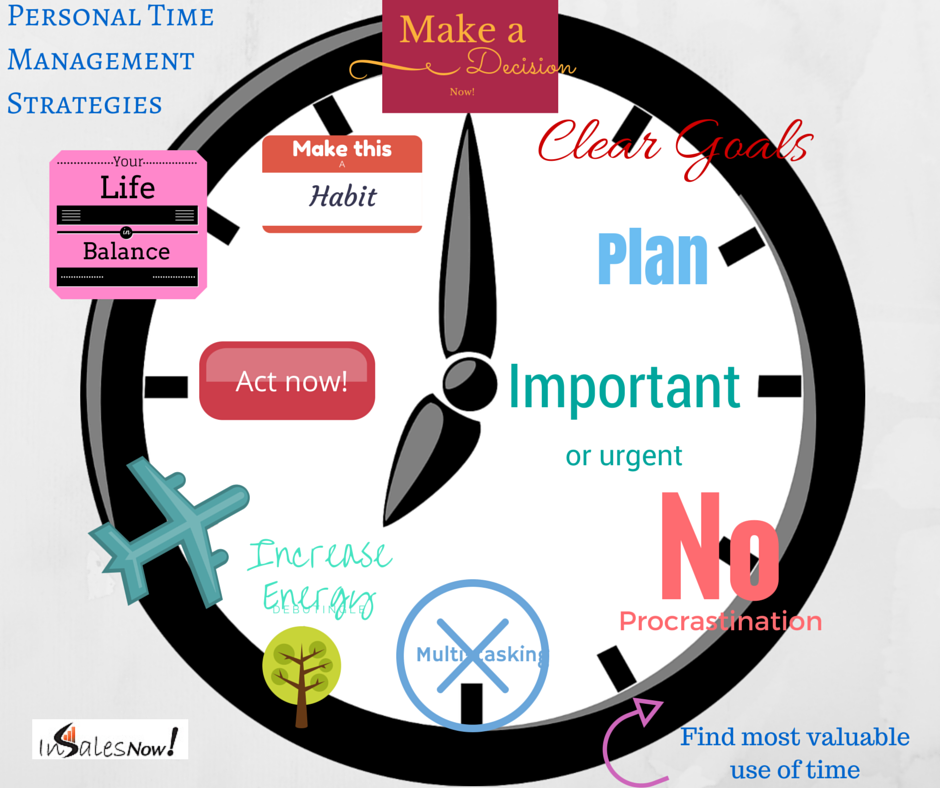
Unfortunately, time is the only thing you can’t reverse, and if you want to accomplish more, you need to learn how to make the most of it. This article will name the most common time management problems and suggest a couple of solutions. Make sure to save this list to go through it whenever you feel the need for additional time management ideas.
Why do we fail to manage time?You would be surprised to know how easy it is to fail at time management. Do you always have that nagging feeling that you have forgotten an important piece of work? If that’s the case, you probably failed to use a to-do list or never used it effectively.
The trick lies in prioritizing the tasks, and many project managers apply A-F coding system, A for high priority items, and F for less important. Alternatively, you could use numbers or other letters.
Remote Work GuideThis guide will give you clear instructions for making a smooth transition towards remote operations, getting the best experience with remote work.
If you have many projects on your to-do list, their descriptions can be ineffective and vague if you aren’t careful enough. For instance, you might have written down “start planning the budget,” but what does that mean? Without necessary details, you might miss key steps or procrastinate.
As you can see, the main reason why we fail to manage time is that we don’t have a system put up in place. There are a couple of strategies or solutions project managers can use to avoid time management issues.
The effects of poor time managementLow quality of work: when trying to finish a job at the last minute, you are more likely to sacrifice the quality of your work for speed. You can easily avoid this by setting some time aside to go through any last-minute changes or mistakes at the end of each day.
Missed deadlines: this can happen to the best project managers, and sometimes you will take on too much work, which will lead to missed deadlines. It’s essential to keep your schedule in check and delegate or cut out unnecessary tasks.
It’s essential to keep your schedule in check and delegate or cut out unnecessary tasks.
Bad working relationships: your poor time management skills could potentially affect your coworkers, for instance, when you are late for a meeting. Planning is a must if you want to avoid awkward situations. Always plan enough time for correction at work.
Procrastination: we are all guilty of pushing off work to the last minute. If you have trouble getting started, sometimes all it takes is a little push. For example, if you want to start exercising and going to the gym, you just need to leave your house. You can apply the same rule to your work. Don’t postpone things just because you have a hard time getting started.
Lack of sleep: are working hours affecting your sleeping habits? While not everyone is a morning person, and you might be more comfortable with alternative working hours, try to maintain a consistent sleep schedule.
Common time management mistakesNot prioritizing. Identifying and focusing on top priority tasks can be challenging because it requires a certain level of dedication. For instance, let’s say you just started working on a high-priority task. In the middle of a brainstorming session, your coworker steals your attention by pointing out that you need to focus on another pressing matter.
Identifying and focusing on top priority tasks can be challenging because it requires a certain level of dedication. For instance, let’s say you just started working on a high-priority task. In the middle of a brainstorming session, your coworker steals your attention by pointing out that you need to focus on another pressing matter.
Getting a late start. All your efforts to complete tasks on time will fail if you don’t start your day early. Even the most influential leaders and CEOs follow this unwritten rule, and starting your day early will ensure you don’t have to rush through tasks to complete everything on time.
Not scheduling tasks effectively. While our productivity level changes during the day, it can significantly vary from one person to another as well. Even though some people are at the peak of their productivity when they wake up, others not so much. The easiest way to balance your time is to discover your peak and leave it for top-priority tasks.
Failing to avoid distractions. Even though various social media platforms and communication channels allow you to stay connected and communicate more efficiently, they are also a major distraction.
Not making the correct estimate. One of the most common problems many project managers face is miscalculating the time and energy needed to complete the task. This behavior is typical for overachievers who believe that everything is under their control.
The solution for poor time managementOne way to improve poor time management skills is to make a schedule and stick to it. For example, you could start planning your time days or weeks in advance. While there will always be time management challenges and surprises, it’s better to have an idea of the tasks and responsibilities you have to deal with every day.
Next on your list should be prioritizing. If you want to execute any project successfully, you have to decide which components and strategies are crucial to your business and whether they will have short-term or long-term effects.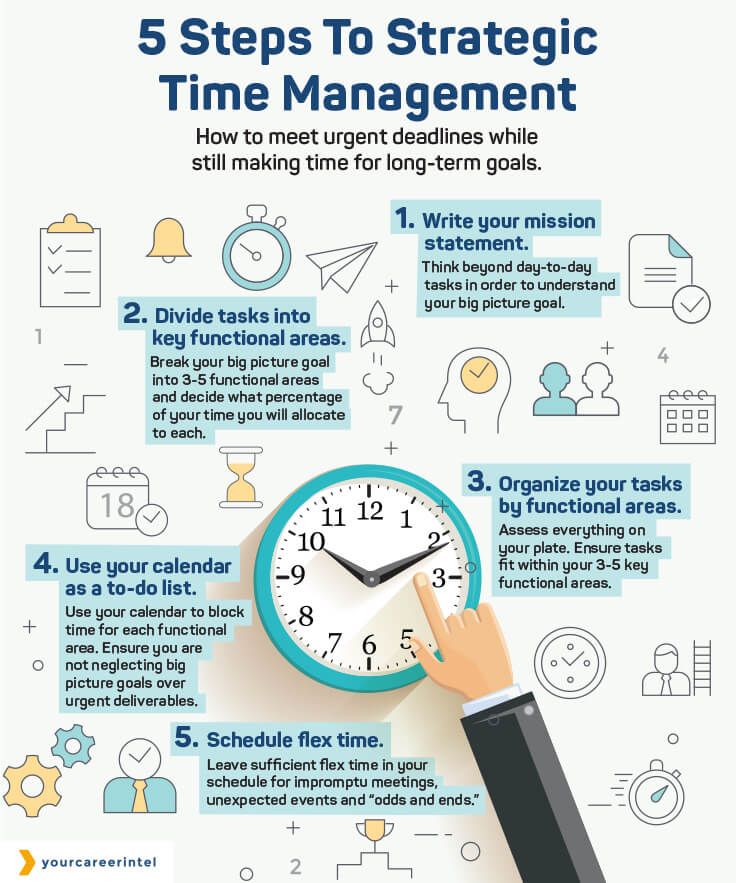
Make sure to establish some boundaries. Let your team know that you are focusing on your tasks and aren’t available during specific hours. They can’t read your mind, so set up boundaries when necessary.
Go for good distractions because regardless of how hard you try, you will get distracted here and there. Additionally, no one can work for hours without a break. The best solution would be to accept distractions and try to pencil them into your schedule.
Time management strategiesTo avoid time management obstacles, you need to accept strategies that will improve your time management skills fully. As you will soon discover, the hardest workers aren’t always the best managers.
That’s why following time management strategies include incorporating tactics into your working routine. On top of that, you need to carefully balance and manage time wisely to get everything done, but without putting too much pressure on yourself. Here are a couple of strategies you might find beneficial:
- Keep in mind that you aren’t perfect.

- Plan each day, don’t make excuses.
- Prioritize your daily, weekly, and monthly tasks.
- Don’t be afraid to use time management tools.
- Don’t multitask.
- Find out when you are most productive.
- Avoid distractions or try to remove them.
- Use a timer.
- Divide massive projects into pieces.
- Learn when to say no.
- Delegate when you can.
- Take a break and charge your batteries.
Principles of time management: mistakes, ways to manage time
Basic mistakes and principles of time management in work and life. 5 ways to properly set up your time management
Time management occupies an important place in the list of soft skills. There are a lot of materials on the Internet on the topic of what time management is and why it is so important in work. But it’s worth talking about what are the main mistakes we make and about the main ways of managing time, which determine the main principles of time management.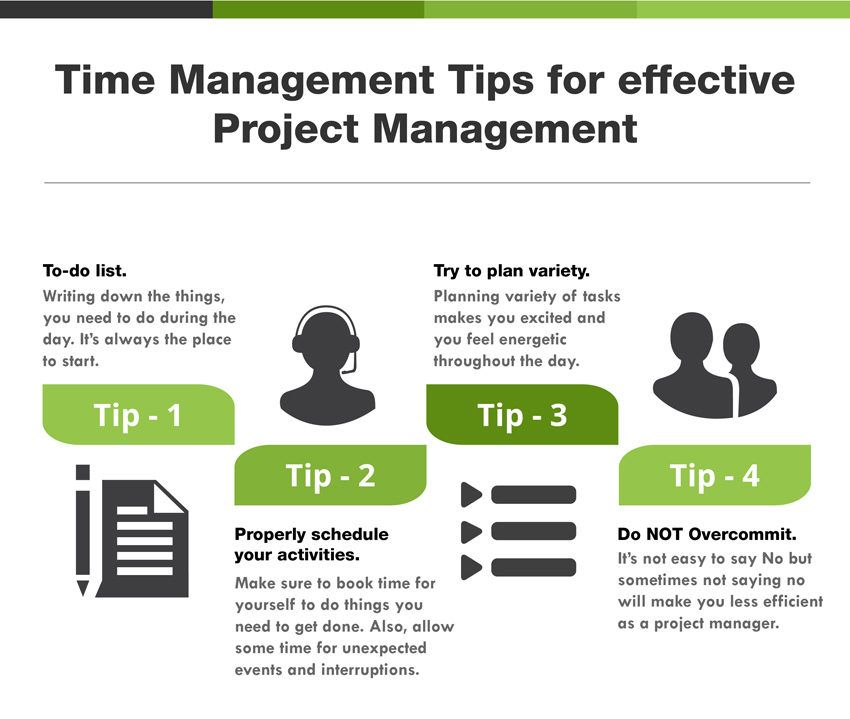 After all, our success and performance at work depend on it. nine0005
After all, our success and performance at work depend on it. nine0005
What is time management
Time management is the process of planning and conscious control of time spent on certain activities, especially valuable for improving efficiency, effectiveness and productivity.
The principles of time management help us decide how to use our time in order to maximize our productivity in achieving certain short and long term goals. nine0005
If you still do not understand how to do everything and not overload your body, but be a useful employee, then we have useful tips for you. There are a couple of ways to help you manage your time more efficiently. This is where the concept of conscious time management comes in.
Mistakes in time management
- To-do list
Making a to-do list is good, but it's more important to make a priority list. All this is important to designate a specific hour period of time. If you write a list, for example, of 20 cases, and 15 of them are secondary, then the probability increases that you will finish with them, but you will not move on to the important ones. nine0005
If you write a list, for example, of 20 cases, and 15 of them are secondary, then the probability increases that you will finish with them, but you will not move on to the important ones. nine0005
- Checking email and social media frequently
This distraction doesn't seem to take much time, but it can ruin all your plans and distract you from your main tasks.
- Multitasking
It's good if you can do several things at the same time, but then you can make mistakes in each of the cases. It is better to use multitasking for small tasks that do not require a lot of time and can be performed by you automatically. nine0005
- Working in a team where you are constantly interrupted
In addition to social networks and mail, colleagues can be an annoying factor. You must prioritize so that colleagues cannot influence your work schedule or set aside time to solve day-to-day tasks or communicate with employees.
- Checking e-mail in the morning
In the morning, it is best to solve complex primary tasks, and only then pay attention to mail and subsequent tasks or problematic issues. nine0005
Time management principles Time management principles
There are several key factors that will allow you to quickly organize your time, and therefore yourself. You can even understand exactly how much free time you have left and distribute it organically.
Well, time management is as follows:
Proper pre-planning prevents poor performance
Your to-do list is your task map, which you will follow day by day to achieve your goal. You must outline for yourself on paper all that needs to be done. Further, this list is disbanded into primary and secondary tasks. Then plan your month, week, day. Work from the long term to the short term. nine0005
Definition of the main thing
To draw up any plan, it is necessary to understand what result we are moving or want to move towards. Then there will be no problems in compiling a to-do list, and in the future there will be no problems in forming the structure of an important task into subtasks. It will be easy for you to determine the time to solve all the tasks and take into account the risks that will delay the time for solving the problem.
Then there will be no problems in compiling a to-do list, and in the future there will be no problems in forming the structure of an important task into subtasks. It will be easy for you to determine the time to solve all the tasks and take into account the risks that will delay the time for solving the problem.
Forced Efficiency Law and
It has been proven that quitting a job and returning to it once again reduces one's productivity by 5%. This indicator may not seem so significant to you, but it delays the moment of execution, which means it increases the amount of time spent on bringing it to its completion. If you are focused on productivity, then it is important to force yourself not to react to irritants and force yourself to implement your plan on schedule. nine0005
Ask yourself three questions and answer them
- What are the most important and valuable things to do?
- What can I and only I do?
- How can you make the most of your time?
After answering these questions, you will understand what points of the plan should be included, in what order and how much they can bring you closer to the successful achievement of your goal.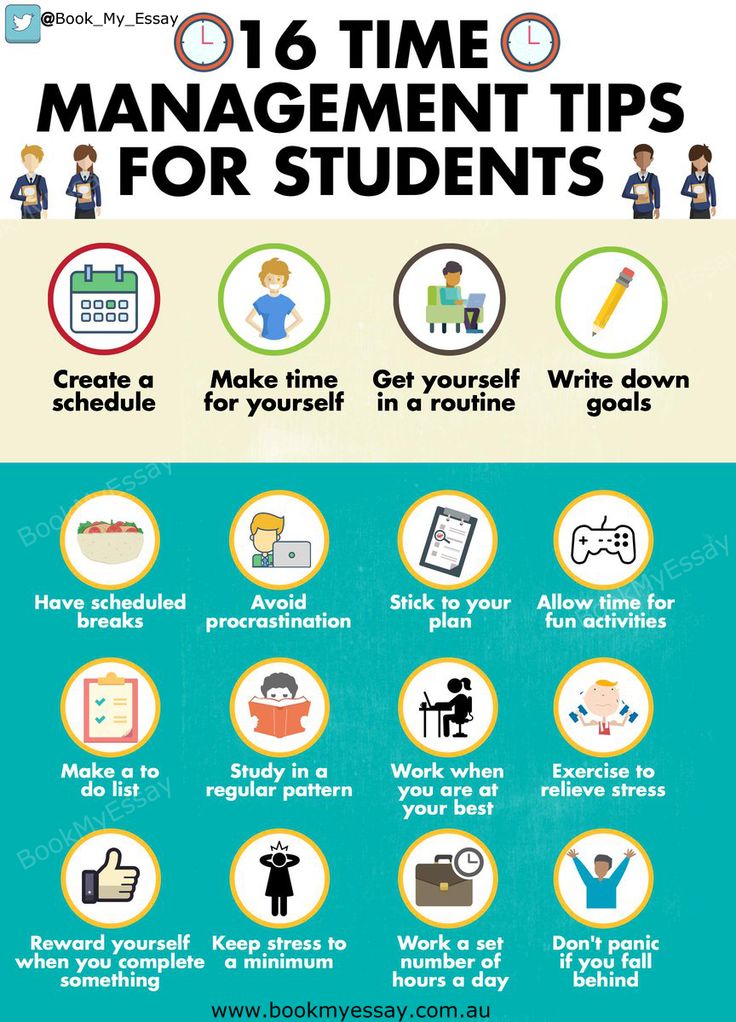 In addition, it will help you determine whether it is necessary or possible to delegate some tasks in order to get the result faster and more efficiently. nine0005
In addition, it will help you determine whether it is necessary or possible to delegate some tasks in order to get the result faster and more efficiently. nine0005
“Eat the frog” first
The hardest thing to do in the morning. After all, each of us has that part of the work for which we need to mentally prepare. And because of this, we put off important things for later. You can't do that. All the most unloved must be done immediately, and then move on to the rest of the plan.
Time Management Tips
- Create a time audit of your affairs.
- Before meetings, define your desired outcomes. nine0024
- Limit the time to complete tasks.
- Plan next week from Sunday.
- Make a daily plan.
- Add a “done list” to your to-do list.
- Do the most important and difficult things in the morning.
- Don't get distracted.
- Avoid multiple tasks at the same time.
- Solve problems now instead of waiting for inspiration to come
- Don't strive for perfection.

- Pay attention to the result and don't get hung up on small details. nine0024
- Schedule breaks between tasks.
- Make the most of your waiting time.
- Make time for exercise.
- Sleep.
- Use your calendar.
- Schedule time for rest.
- Learn to say no.
- Come to work early.
- Don't answer the phone just because it's ringing.
- Turn your system into habits.
All this will help you not only in work but also in life. When we learn to highlight the main tasks and prioritize, we can get rid of unnecessary and useless habits. It will also help us become more successful and not require 48 hours a day. nine0005
Time management from Lesya Ryabtseva: how to make time work for you
March 13, 2017 Productivity Column
Journalist and blogger Lesya Ryabtseva tells how to cope with the vagaries of time by following simple time management rules.
Lesya Ryabtseva
Journalist, blogger. Facebook profile*.
Facebook profile*.
Time is a wayward person who demands a lot of respect. This is the first rule with which to approach time management. We are accustomed to adjusting external resources for ourselves, instead of adjusting life to the surrounding reality. Everything that surrounds us begins and ends only thanks to time. But we can deal with his whims by following simple time management rules. nine0005
1. Synchronize your internal clock with your external clock
When making plans, remember seconds, minutes, hours and days. Even if you really want to come up with your own flow of time, you will not succeed. Time will not go differently, you still have to obey its rules.
Therefore, take into account the time intervals that exist, try to feel them. For example, note how much time you spend reading a book, sorting mail, brushing your teeth. As a result, your internal clock is synchronized with the external one. You will also notice which of your habits require temporary improvements.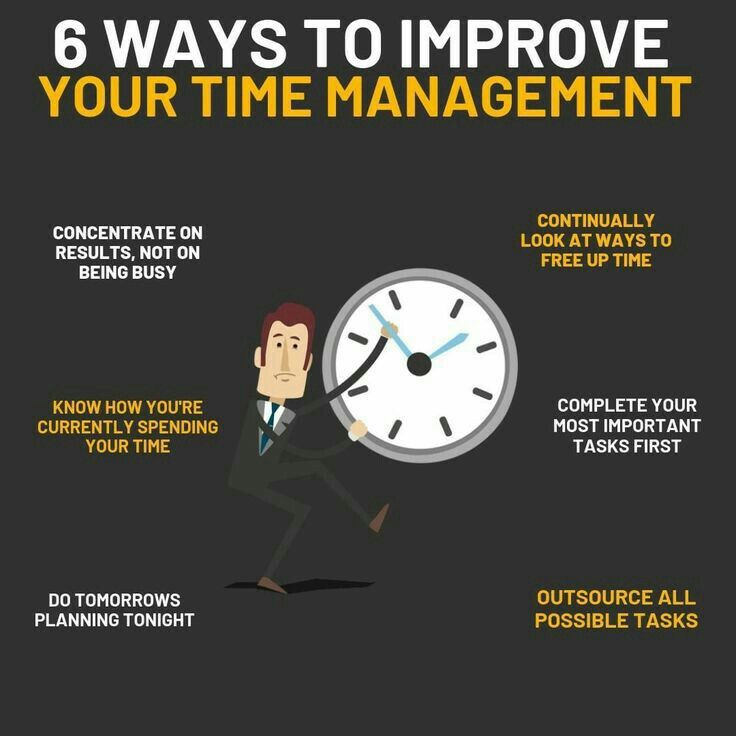 nine0005
nine0005
2. Appreciate the seconds
Don't underestimate the seconds and minutes. Some of your cases do not cost more than five minutes, and some of the meetings can be taken no more than half an hour. If you know the purpose and purpose of the event, it becomes easier to plan it.
Exactly as much time is spent on any task as you allocate to it. When planning your day, imagine in advance how much time you will need for each task and whether this task is worth the time allotted to it.
3. Treat time as a gift
Think of time not as a punishment, but as a gift and a friend. We usually complain about not having enough time, instead of changing our mindset to be positive. Rejoice that you have as many as 24 hours every day, of which eight can be devoted to sleep, and the rest to spend on your favorite things.
If you like, talk to the time. Realize that he doesn't want anything from you.
4. Bargain with time
Time can work for you if you give it something in return. Do you want to get up early and be on time? Try to go to bed earlier. Ancient Indian sages said that the morning begins with the evening. In addition, each hour of sleep before midnight is equal to two, but sleep after twelve is already one hour. nine0005
Do you want to get up early and be on time? Try to go to bed earlier. Ancient Indian sages said that the morning begins with the evening. In addition, each hour of sleep before midnight is equal to two, but sleep after twelve is already one hour. nine0005
5. Be Mindful
If you don't get distracted by procrastination, social media, and multi-tasking, you can carve out some useful hours. The main principle of a successful time manager is awareness while wasting time. Every business must be under control. You should not throw off responsibility and blame the lack of time, traffic jams or screaming children for failed plans.
6. Set your own priorities and deadlines
Set your priorities. Time is not infinite, which means that there is something that you can do today, and something that will definitely wait until tomorrow. Everything has a deadline. The only difference is that you set your own deadlines, not your bosses. nine0005
7. Dedicate your time to each task
Morning is better for some tasks than evening.



